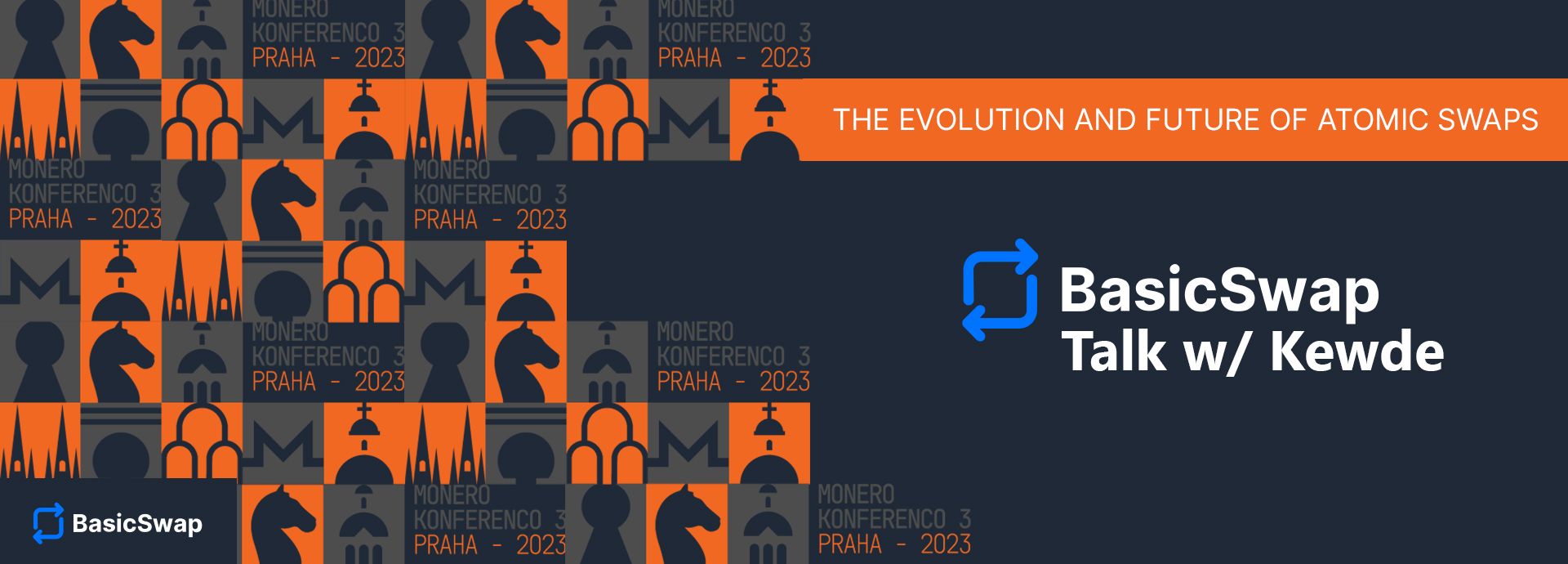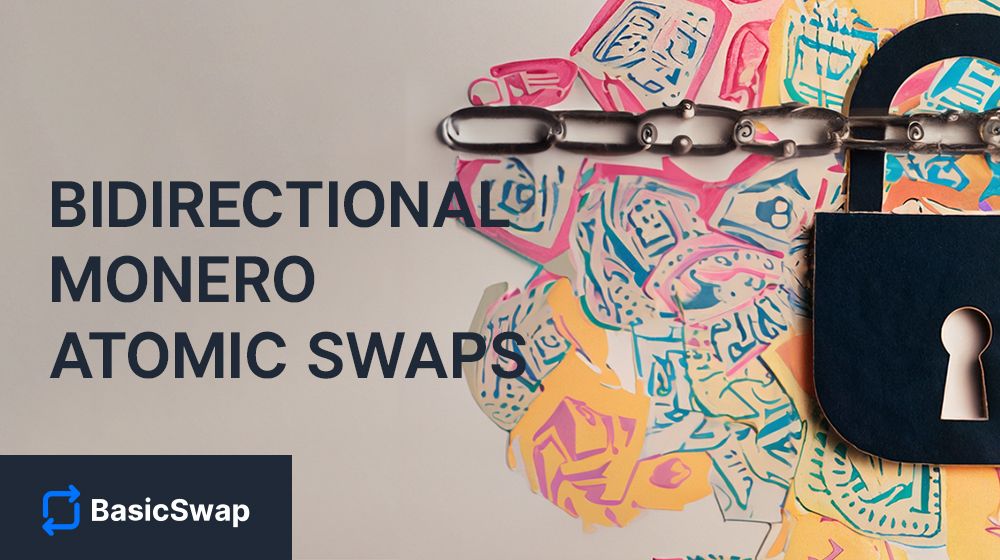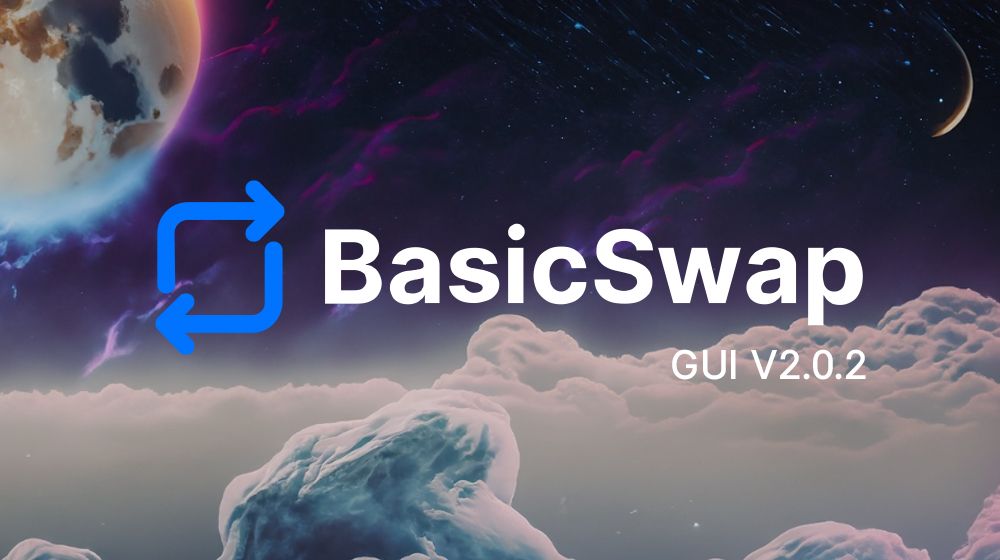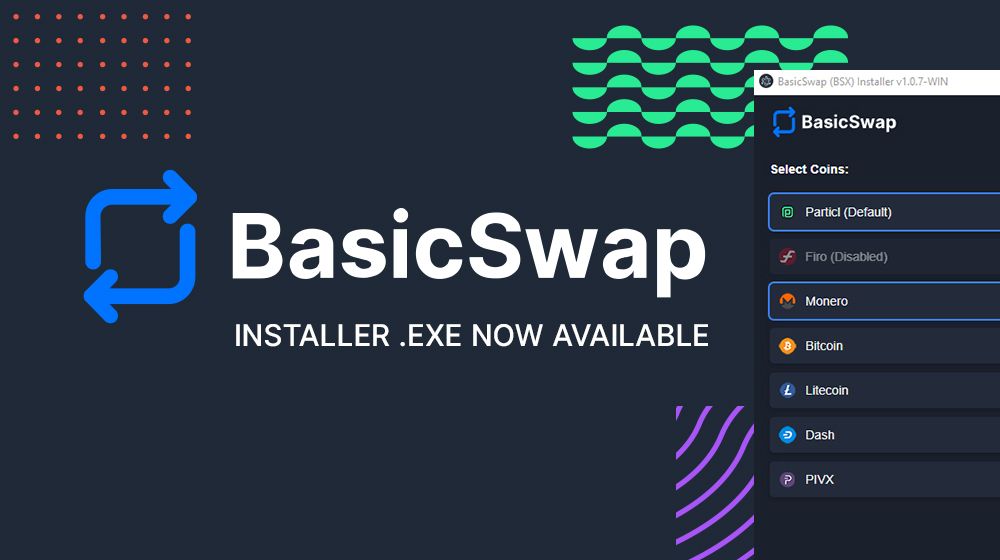
This summer, we had the honor of being invited to MoneroKon 2023 in Prague, where our team from BasicSwap DEX was represented. Our developer, Kewde, gave an insightful presentation on the evolution, future, and historical context of atomic swaps, with a particular focus on their application with Monero.
The presentation is available, in full, on our Youtube channel, and you can watch it here.
What we've Achieved Since the Presentation
Since presenting in June 2023, we achieved significant milestones in our road towards making the DEX more usable, accessible, and feature-complete.
Bidirectional Adaptor Signature Atomic Swaps

Probably the most significant achievement since has been the deployment of bidirectional adaptor signature atomic swaps, as detailed here.
Adaptor signature swaps were groundbreaking when they were first published because they enabled atomic swaps between two blockchains, even if only one had programmable outputs.
This development was a game-changer, particularly for Monero, as it allowed for atomic swaps with other cryptocurrencies like Bitcoin and Particl, marking a significant leap forward in our collective goal of preserving our financial privacy and sovereignty.
However, these swaps had a limitation: they were unidirectional. This meant they could only occur when the coin with programmable outputs (i.e., Bitcoin) was the one being offered. In practical terms, that means Monero couldn't be the coin offered in the swap; it could only be received in exchange for another coin like Bitcoin.
The introduction of bidirectional adaptor signature atomic swaps by BasicSwap DEX is a pivotal contribution to this technology. By utilizing Particl's SecureMessaging Network (SMSG), we've developed a method that, from the user's perspective, enables the coin without scriptable outputs to be swapped from both the offerer and bidder sides.
For those interested in a deeper understanding of this significant advancement in atomic swap technology, we highly recommend reading this blog post on the subject or exploring our DEX Revolution series available here. Additionally, we've published a detailed article here that compares standard HTLC atomic swaps with adaptor signature-based atomic swaps, providing more insights into the differences between these two atomic swap technologies.
Better User Interface

We've been continuously improving BasicSwap's user interface, and we're pleased to share that a major UI/UX update (version 2.1) is on the horizon.
For those interested in what this update entails, we've provided a detailed overview in our weekly development progress update here. We encourage you to head over there to learn more about all the improvements and changes that will be part of this upcoming release.
Graphical Installers

We've recently released a graphical installation wizard for Windows users (.exe) for those looking for an easier approach to setting everything up. This new feature not only simplifies the installation process for Windows users but has also driven a series of back-end improvements.
Currently, the installation wizard is exclusive to Windows, but we're actively working on extending it to MacOS and Linux users. We aim for a release on these operating systems shortly, stay tuned for more any news in that regard published on Particl News.
What's on the Horizon
While 2023 was focused a lot on the DEX's back-end and developing some of its core features, 2024 is poised to be a pivotal year for BasicSwap as we will release some of its most significant updates in terms of usability and accessibility.
Here are just a few main items we plan on working on. Note that this isn't a fully exhaustive list and we are likely to work on other items as well, especially back-end improvements and new functionalities.
Light Nodes / Remote Services
This improvement will have substantial benefits for users. In the first place, it eliminates the need to download the entire blockchains for each coin, which currently leads to rather large storage space requirements and lengthy setup times. Additionally, it will substantially reduce the CPU usage of the DEX, potentially by more than 90%.
Currently, running multiple coin cores simultaneously is a resource-intensive process and is the primary reason for BasicSwap's high CPU requirements. However, we want to emphasize that running full nodes provides the highest level of security and privacy. Therefore, while we're introducing light nodes and remote services as an option to improve usability and reduce resource demands, they will never be mandatory. This approach ensures that users who prioritize maximum security and privacy can continue to run full nodes, while those who prefer a quick setup and easy access can also enjoy exactly what they're looking for.
Web Framework
As an extension of our current work on remote services, we plan on building a web framework that will enable users to interact with BasicSwap-related services directly via the web. This step is particularly important in an era where even "Web3" technologies are predominantly web-based.
However, we're very much aware of the security and privacy challenges that hosting a decentralized application (dApp) on the web can pose. Therefore, similar to our approach with light nodes and remote services, any web-based version of BasicSwap will be entirely optional and we will not transition to a web-only approach. Our goal is to provide both web-based and traditional options, catering to a broad range of user preferences and needs. This is key to attracting more users and, consequently, improving the liquidity of the DEX's order book which is critical to its success.
The exact implementation of this web framework is still being determined, and the specifics are subject to change as we progress. Therefore, we cannot yet commit to any sort of official announcement. We will continue to provide regular updates on this development in our weekly progress reports here.
More Coins
We are committed to adding many more coins moving forward. As our focus lies in privacy, we will naturally focus on privacy coins. However, we also recognize the importance of diversifying our offerings to attract a broader user base. To this end, we plan to include different types of coins and tokens like ETH and its various ERC-20 tokens, (e.g., stablecoins), in our lineup.
Again, attracting a large number of users to BasicSwap is essential as it directly contributes to increasing the liquidity of the overall ecosystem. This, in turn, makes the various currency pairs available on the DEX more liquid and practical for trading purposes.
Since our presentation at MoneroKon, our efforts have primarily been focused on essential back-end developments, which has limited our capacity to integrate new coins. However, as we move into 2024, we anticipate adding a decent number of new coins and tokens to the DEX.
We're certainly excited about expanding BasicSwap to other communities and build more bridges between communities! ?
Taproot Integration
Because Bitcoin's Taproot update isn't fully complete yet — it still misses the Schnorr aggregated signatures — we haven't been able to complete our Taproot update which will bring massive privacy benefits.
While our current adaptor signature swaps do not leave an identical hash on the blocks of the two participating blockchains, they do result in a multi-signature transaction on the blockchain of the coin with programmable outputs (for example, Bitcoin in a BTC <> XMR swap). It's important to note that this does not disclose any information about the swap to outside observers. The transaction doesn't reveal itself as a swap; it appears as a standard multi-signature smart contract. However, it still doesn't look like a perfectly regular Bitcoin transaction.
The full integration of Taproot into Bitcoin and Particl pairs using adaptor signature swaps will be a game changer. It will make the multi-signature transaction indistinguishable from regular transactions on the blockchain of the coin with programmable outputs, significantly boosting the fungibility and privacy of BasicSwap-powered swaps done this way.
It's worth emphasizing that even in their current state, adaptor signature swaps are exceptionally private. However, we always strive to improve the privacy of our platform in any way we can, and integrating Taproot into our swaps is simply a logical step forward in pushing the boundaries in the realm of financial privacy and digital sovereignty. "Hide within the noise"!
If you are reading this, we want to express our gratitude for your support and for participating in the open-source, privacy-first revolution — your involvement is a valuable contribution to this movement.
Thank you for being a part of this journey towards a more secure, private, and decentralized digital future.
The Open-Source Revolution
We're on a mission to create a private, independent, and pro-liberty digital economy that is fair and open to all. Learn more about what we do at any of the following links.
Be a part of the movement and join us in the fight for our freedoms by meeting the community and spreading the word far and wide!
Discord Telegram Element / Matrix
Learn more about Particl with these in-depth resources.
Website BasicSwap DEX Academy Wiki
Follow the link below to get a list of all other useful Particl-related links you may find helpful.
